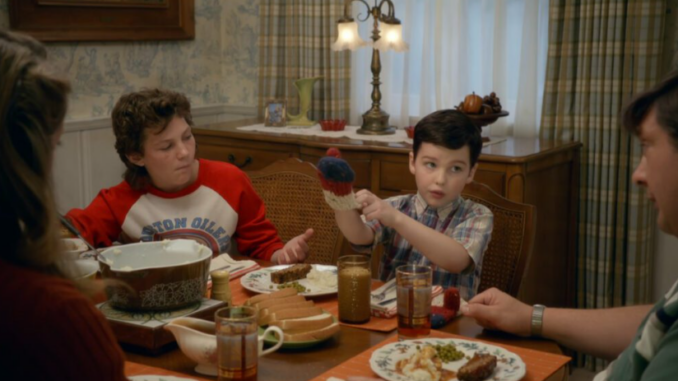
The Emotional Reason Sheldon Doesn’t Have a Dining Table in The Big Bang Theory
Have you ever wondered why The Big Bang Theory’s Sheldon Cooper is so dead-set against having a dining table in his apartment? Fans have picked up on this peculiar quirk since early in the series, but few realized it had roots in his childhood, as slowly revealed in Young Sheldon. This spinoff has done more than entertain us; it’s provided backstory for Sheldon’s odd behaviors, finally shedding light on one of his most baffling choices. Among these mysteries? Why Sheldon refuses to embrace the idea of a dining table.
Why Sheldon’s Childhood Holds the Key to His Dining Table Aversion

Exploring Sheldon’s Childhood in Young Sheldon Young Sheldon dives deep into Sheldon Cooper’s backstory, portraying the moments that shaped him. Seven seasons in, one tiny detail hints at why Sheldon might hate dining tables—a heartwarming yet heart-wrenching clue.
Sheldon’s Spot at the Table In Young Sheldon, we see young Sheldon seated in a particular spot at his family’s dining table, always next to his father. This seating arrangement mirrors his “spot” on the couch in The Big Bang Theory, hinting at an emotional connection.
Sheldon’s Spot: More Than Just a Place to Sit
Why Sheldon’s Spot Means So Much Fans of The Big Bang Theory recall Sheldon’s unwavering attachment to a spot on the couch. As Young Sheldon unfolds, this behavior takes on emotional weight. Young Sheldon’s spot next to his father likely held sentimental value, especially after his father’s passing.
Scientific or Emotional? In The Big Bang Theory, Sheldon offers scientific explanations for his spot preference, citing airflow and lighting angles. But could these “logical” reasons be covering a deeper, more emotional connection?
The Dining Table Scene in The Big Bang Theory

Sheldon’s Resistance to the Dining Table There’s a memorable scene in The Big Bang Theory when Penny suggests getting a dining table. Sheldon reacts strongly, and though he never explains why, his objection is firm: no dining table.
A Subconscious Response to Loss? Examined through the lens of Young Sheldon, this aversion takes on new meaning. Could Sheldon’s resistance stem from a painful association between dining tables and his father’s absence?
Leonard: Filling in the Role of Sheldon’s Father Figure
Sheldon’s Complex Bond with Leonard Beyond being roommates, Sheldon and Leonard share a bond that mirrors a familial relationship. Leonard often steps into the role of caregiver, much like Sheldon’s father once did.
Leonard’s Position Beside Sheldon Leonard consistently sits to Sheldon’s left, much like Sheldon’s father did at their family dining table. It’s as if Leonard stepped into the role of a steadying presence, just like Sheldon’s dad.
Dining Tables and Family Memories in Young Sheldon

The Nostalgia of the Family Table Dining tables often symbolize family gatherings, warmth, and shared memories. In Young Sheldon, the table was where the family came together, with Sheldon’s father always nearby, creating a sense of stability.
How His Father’s Absence Affected Him Sheldon’s father’s passing left a profound impact. Not having a dining table could be his way of preserving his father’s memory or avoiding the loss that a dining table might remind him of.
How Young Sheldon Adds Layers to The Big Bang Theory**
Small Details, Big Emotional Impact Young Sheldon recontextualizes what we already know about Sheldon, adding emotional weight to details like where he sits or his attachment to his “spot.”
Connecting the Dots The continuity between Young Sheldon and The Big Bang Theory lets fans see Sheldon as a complex character shaped by loss and family ties.
The Producers’ Insightful Choices
How the Creators Built Sheldon’s Story It’s no accident that Leonard’s role feels paternal or that Sheldon clings to his “spot.” These details hint at the careful thought behind Sheldon’s backstory.
Intentional or Not, Fans Appreciate the Depth While it’s unclear if every detail was intentional, the connections between Young Sheldon and The Big Bang Theory add significant emotional depth for fans.
Why Fans Are Fascinated by These Revelations
Why This Detail Matters to Fans Fans of The Big Bang Theory love Sheldon for his quirks and vulnerability. Discovering these deeper layers only adds to that affection.
Nostalgia Fuels Fan Theories This theory about the dining table has sparked discussions, with fans revisiting scenes and searching for clues about Sheldon’s complex past.
Conclusion
The insight from Young Sheldon about Sheldon’s childhood dining table brings new understanding to his behavior in The Big Bang Theory. By connecting early experiences with adult quirks, fans gain a fuller understanding of Sheldon as someone shaped by love, loss, and family ties. His unyielding attachment to his “spot” serves as a quiet reminder of the emotional roots that shape us all.
FAQs
Q1: Why doesn’t Sheldon want a dining table? Sheldon may avoid dining tables due to memories of his father, who always sat next to him. This connection makes it difficult for him to embrace having a table.
Q2: Does Young Sheldon explain Sheldon’s attachment to his “spot”? Yes, Young Sheldon shows that Sheldon always had a specific spot at his family dining table, likely giving him a need for consistency.
Q3: How does Leonard’s role reflect Sheldon’s father? Leonard often steps into a caring role similar to Sheldon’s father, adding depth to their relationship.
Q4: Did the writers plan these details from the start? While it’s uncertain if every detail was planned, the connections between Young Sheldon and The Big Bang Theory enrich Sheldon’s character.
Q5: What do fans gain from this revelation? Fans gain a deeper understanding of Sheldon’s quirks and a newfound empathy for his journey.